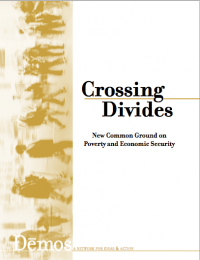Examining four cases of policymaking during the 1990s -- the Earned Income Tax Credit, Individual Development Accounts, the Children's Health Insurance Plan, and Empowerment Zones -- suggests some emerging common ground among liberal and conservative policymakers.
Introduction
During the 20th century, many policies aimed at reducing poverty and building economic security were enacted or expanded during periods of broad political consensus about how to foster greater equity. Since the early 1980s, however, issues of poverty and economic opportunity have been among the most divisive areas of American politics. The first year of the George W. Bush administration saw these divisions fla re up in polarized debates about taxes, Medicare, Social Security, the economic stimulus package, and a range of social programs. In early 2002, congressional debate over the reauthorization of the 1996 welfare law revealed these partisan tensions, with the Bush administration emphasizing stricter work requirements and efforts to promote marriage, and many Democrats stressing new investments in child care and job training to help move people out of poverty.
Meanwhile, the challenges faced by low-income Americans remain great: Nearly 50 million Americans live below 125 percent of the poverty line; a third of families have zero or negative assets; and tens of millions of working parents lack key supports like affordable child care and health care. African-Americans and Latinos are especially likely to be living in poverty or barely getting by on the lower rungs of the middle class. For the many Americans who did not share in the prosperity of the '90s, political deadlocks in Washington and in state capitals have had profoundly harmful consequences.
The United States has succeeded in the past at making major strides toward expanding economic opportunity and improving well-being for everyone. Renewing this progress will now require a higher level of political consensus about how to address the problems of America's prosperity gap. To be enacted in legislation -- and to be fully implemented in good faith over ensuing years and decades -- policy initiatives to broaden economic security require strong bipartisan backing. While short-term partisan advantages can get policies enacted, long-term political consensus is required if policies are to succeed. For advocates trying to promote greater equity, a central challenge is to develop or expand policies that resonate with value systems on both sides of the political divide. A related challenge is to discuss these policies in ways that capture the support of a public that is divided over such questions as the causes of poverty, the extent of opportunity that exists in the United States, and the role of government in addressing economic inequities.
This report explores the nature of common ground around public policy aimed at improving the economic well-being of low-income individuals and families. While highlighting the significant differences in values and approach that exist in the political arena, the report suggests that there has been more convergence of perspectives than many people realize. During the last decade, Republicans and Democrats have come together to enact or expand several historic efforts to enhance economic well-being, including:
The Earned Income Tax Credit (EITC).
Individual Development Accounts (IDAs).
The State Children's Health Insurance Program (SCHIP).
Empowerment Zones.
These advances in public policy have not gone nearly as far as some have hoped. These and many other effective measures to increase economic well-being and opportunity for lower-income Americans have often not been implemented at the scale needed to make a real difference.
Still, the developments in public policy that this report examines are significant. Recent bipartisan backing for policies to support low-income working families and build wealth among poor individuals and communities hints at a potential new political consensus. During the last few years, after a long domestic cold war, liberals and conservatives have begun to find some new common ground on values related to economic equity and social policy. Liberals are now more likely to stress traditional conservative themes like the importance of work, entrepreneurship, and personal responsibility; conservatives are invoking liberal ideas such as the need to make work pay and to help poor families and communities build wealth and assets. Today, it is possible to talk about a new debate in America about poverty and economic security -- one that is very different from debates of the past quarter century.
